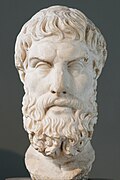Epicureanism
Epicureanism is an ancient school of philosophy that was founded by Epicurus in the 4th century BC. Epicureanism was originally based in the Garden, a community established by Epicurus in Athens. The philosophy of Epicureanism emphasizes the pursuit of pleasure and the avoidance of pain as the ultimate goal of life.
Philosophy[edit]
Epicureanism is based on the teachings of Epicurus, who believed that the greatest good is to seek modest pleasures in order to attain a state of tranquility and freedom from fear, as well as absence of bodily pain. This state is referred to as 'Ataraxia'. Epicurus also taught that the gods, while they do exist, have no involvement in human affairs and do not punish or reward people for their actions.
Ethics[edit]
Epicurean ethics is a form of hedonism, although it is not the pursuit of any and all pleasure that Epicurus advocated, but rather the pursuit of pleasure through tranquility, modesty, and limiting one's desires. Epicurus argued that most of the pain that humans experience is the result of their desires, and that by limiting these desires, one can greatly reduce their amount of suffering.
Physics[edit]
Epicureanism also includes a comprehensive physical theory. Epicurus was an atomist, following in the footsteps of Democritus. He believed that the universe is infinite and eternal and that all things are composed of extremely small, invisible particles known as 'atoms' that are eternally in motion.
Legacy[edit]
Epicureanism was popular throughout the ancient world, and its influence continued into the modern era. It has been a major influence on many philosophers and writers, including Thomas Jefferson, who referred to himself as an Epicurean.
See also[edit]
References[edit]
<references />
Ad. Transform your life with W8MD's Budget GLP-1 injections from $75


W8MD offers a medical weight loss program to lose weight in Philadelphia. Our physician-supervised medical weight loss provides:
- Weight loss injections in NYC (generic and brand names):
- Zepbound / Mounjaro, Wegovy / Ozempic, Saxenda
- Most insurances accepted or discounted self-pay rates. We will obtain insurance prior authorizations if needed.
- Generic GLP1 weight loss injections from $75 for the starting dose.
- Also offer prescription weight loss medications including Phentermine, Qsymia, Diethylpropion, Contrave etc.
NYC weight loss doctor appointmentsNYC weight loss doctor appointments
Start your NYC weight loss journey today at our NYC medical weight loss and Philadelphia medical weight loss clinics.
- Call 718-946-5500 to lose weight in NYC or for medical weight loss in Philadelphia 215-676-2334.
- Tags:NYC medical weight loss, Philadelphia lose weight Zepbound NYC, Budget GLP1 weight loss injections, Wegovy Philadelphia, Wegovy NYC, Philadelphia medical weight loss, Brookly weight loss and Wegovy NYC
|
WikiMD's Wellness Encyclopedia |
| Let Food Be Thy Medicine Medicine Thy Food - Hippocrates |
Medical Disclaimer: WikiMD is not a substitute for professional medical advice. The information on WikiMD is provided as an information resource only, may be incorrect, outdated or misleading, and is not to be used or relied on for any diagnostic or treatment purposes. Please consult your health care provider before making any healthcare decisions or for guidance about a specific medical condition. WikiMD expressly disclaims responsibility, and shall have no liability, for any damages, loss, injury, or liability whatsoever suffered as a result of your reliance on the information contained in this site. By visiting this site you agree to the foregoing terms and conditions, which may from time to time be changed or supplemented by WikiMD. If you do not agree to the foregoing terms and conditions, you should not enter or use this site. See full disclaimer.
Credits:Most images are courtesy of Wikimedia commons, and templates, categories Wikipedia, licensed under CC BY SA or similar.
Translate this page: - East Asian
中文,
日本,
한국어,
South Asian
हिन्दी,
தமிழ்,
తెలుగు,
Urdu,
ಕನ್ನಡ,
Southeast Asian
Indonesian,
Vietnamese,
Thai,
မြန်မာဘာသာ,
বাংলা
European
español,
Deutsch,
français,
Greek,
português do Brasil,
polski,
română,
русский,
Nederlands,
norsk,
svenska,
suomi,
Italian
Middle Eastern & African
عربى,
Turkish,
Persian,
Hebrew,
Afrikaans,
isiZulu,
Kiswahili,
Other
Bulgarian,
Hungarian,
Czech,
Swedish,
മലയാളം,
मराठी,
ਪੰਜਾਬੀ,
ગુજરાતી,
Portuguese,
Ukrainian





